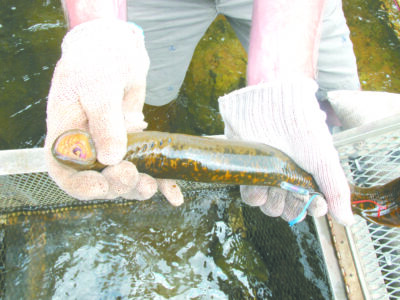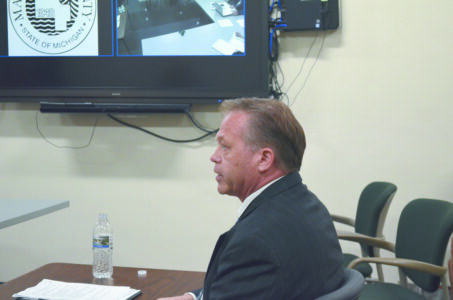KEEPING SUPERIOR CLEAN
Local scuba diver uses skills to haul litter out of lake, protect water sources

Local diver Don Fassbender is shown underwater. (Photo courtesy of Don Fassbender via 8-18 Media)
- Local diver Don Fassbender is shown underwater. (Photo courtesy of Don Fassbender via 8-18 Media)
- A refrigerator is hauled out of the lower harbor in Marquette. (Photo courtesy of Don Fassbender via 8-18 Media)
Don Fassbender, local scuba diver extraordinaire, has dedicated his diving career to keeping the “Fresh Coast” fresh.
Fassbender started scuba diving 30 years ago because he wanted to see what was beneath the waves of Lake Superior and what he saw below the surface shocked him into action.
“Everywhere I would go there would be at least a little bit of trash, whether it was just pop bottles or beer cans or something like that, wrappers. But when I started spending more time in Marquette’s lower harbor I would see a lot of trash,” he said.
“And that was alarming to me to think there was so much trash in the cleanest of the Great Lakes, the greatest of the Great Lakes. Superior is cleaner than all the lower Great Lakes, but to see the amount of trash that was in this particular one made me worry that what we are doing to future generations’ water supply is just a terrible thing. If it’s happening here, it’s happening everywhere.”

A refrigerator is hauled out of the lower harbor in Marquette. (Photo courtesy of Don Fassbender via 8-18 Media)
Fassbender thinks that taking action to clean up the lake now can have a big impact going forward.
“I read a study where some scientists think that approximately 10% of microplastics in our oceans today come from tires that dissolved in the water — and Lake Superior … that is our drinking water. That’s my daughter’s drinking water and hopefully her daughter’s source of drinking water. And we don’t want to pollute it anymore,” Fassbender said.
“It has been polluted by generations that came before us. I think it is something we need to take upon ourselves to do … to correct the wrongs of the past and to set examples for future generations on how not to treat the planet.
“We cannot survive without water, so I think it is incumbent upon me and anyone else who goes scuba diving to make the place a little bit better than how they found it.”
Fassbender currently organizes local cleanup dives in Marquette, but no matter where he dives, he is prepared to do his part.

ANJA McBRIDE
“When I go diving, for example, there was a port I visited a couple of months ago, I brought my mesh bag with me and I cleaned up down there. Everywhere I go I am cleaning trash out of the water,” he said. “But as far as organized dives, there is quite a bit to them so I leave that for Marquette. I do intend to take the show on the road and go to other harbors and clean up, but for now, so far, it’s mostly here in Marquette County.”
Fassbender’s organized cleanup dives in Marquette are coordinated with all volunteer divers.
“When it comes to the cleanup in Marquette I have some people coming from all throughout the Midwest and they are volunteers, but it is usually the same faces that I see.
“The same gentleman coming from down in Indiana comes up to help me every time. There are two couples from downstate. They make the trip each year. They love it up here and they want to see it remain beautiful,” he said.
“As far as the local dive scene there is a good number of people here but not all of them volunteer for the cleanup. There is a lot to it and I wouldn’t recommend that just anybody hop in the water and try to pick up trash if you are not very experienced. The No. 1 rule of thumb is to stay alive. I’m being truthful here. There are dangers associated with diving, so it’s not to be taken lightly.”
During Fassbender’s expeditions, he has found a lot more than small pieces of trash. He’s found items such as refrigerators, car parts and tires, but there’s one treasure that stands out to him.
“That would be a diamond ring tied to a rock. I still have it. Not the rock. But the ring,” Fassbender said.
Those who are thinking about getting their diver’s certification should know that it takes time and practice to make sure divers are the safest they can be underwater.
For those who are not certified divers, there are many other ways they can help keep the world’s largest freshwater lake clean.
“All paths lead to the lake. If you see something on the street: cigarette butts, straws, plastic bags, what have you. They can ultimately find their way to the beach through stormwater and so forth, so just try to pick up after yourself,” Fassbender said. “If you see something that isn’t right, try to correct it yourself if you can do so safely, if not bring it to the attention of others.
“I’ve been through areas where, in creeks, there are tires and other things that look like paint cans or something acidic in these cans and they are starting to rot away, and instead of ignoring it, call it to the attention of someone.
“You can seek out Superior Watershed (Partnership), for example, and volunteer for one of their programs. They do a number of cleanups in the watershed and that doesn’t necessarily mean in or underwater. Seeking out places to volunteer and to help would be a good start.”
Or maybe it’s as simple as this: The next time you are taking an evening walk and see somebody’s empty old chip bag sitting on the edge of the road, think about where it will end up, and choose to pick it up to help keep our lake clean now and for future generations.
Anja McBride, 8-18 Media reporter, is 16 years old.








